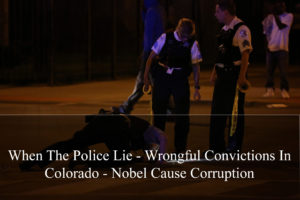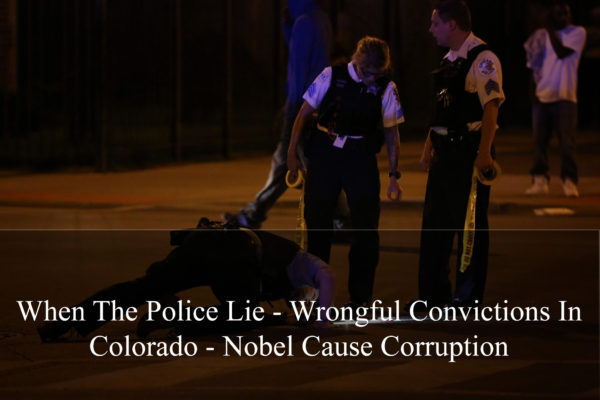






When The Police Lie – Wrongful Convictions In Colorado – Nobel Cause Corruption
By H. Michael Steinberg Colorado Criminal Defense Lawyer – Attorney
KW – When The Police Lie – Wrongful Convictions In Colorado – Nobel Cause Corruption
 When The Police Lie – Wrongful Convictions In Colorado – Nobel Cause Corruption – While most police officers are honest and hardworking – some get so caught up in the adversary nature of the criminal justice system to the point that they slant their testimony or even lie outright under oath.
When The Police Lie – Wrongful Convictions In Colorado – Nobel Cause Corruption – While most police officers are honest and hardworking – some get so caught up in the adversary nature of the criminal justice system to the point that they slant their testimony or even lie outright under oath.
The actions of these individuals – even the most well meaning cops who may act of “noble cause corruption” – destroy lives forever.
Police Acting Out Of Notions Of So Called “Nobel Cause” Purposes When They Corrupt Investigations
It is extremely rare to have a truly bad police officer commit intentional perjury on the witness stand. More often the motivation of lying police officer is based on what has been named “noble cause corruption.”
Noble cause corruption stands for the proposition that a police officer will lie because the officer believes that “good outcomes justify bad behavior.” The ends justify the means…
What follows is taken from a police officer based website describing noble cause corruption:
Remember, we are talking about good officers trying to do the right thing (noble cause), but due to bureaucratic red tape, a lack of evidence, or any other roadblock to “getting the job done,” they feel forced to bend or even break the rules to catch the bad guy (corruption).
For instance, a police officer desires to make the streets safer. But he knows that he cannot catch all the bad guys in the streets since they are smart and they know how to dispose of any evidence against them. The police officer may start violating the law by fabricating or planting evidence on these persons for the purpose of ensuring their conviction.
Distinguishing Noble Corruption From Traditional Corruption
“Traditional corruption” is using of one’s official position for personal benefit and gain.
The “traditionally corrupt” police officer acts ONLY for him or herself. There is no noble purpose – as there is nothing noble about pursuing one’s own interest.
“Noble Corruption” Or “Traditional Corruption”- The Impact On The Accused Is The Same
One example of noble cause corruption is the intentional violation of the constitutional rights of the accused with the intention of the greater good of society.
While noble cause corruption is committed in the name of good ends – is still corruption. Even if a police officer believes the target of an investigation is guilty of the crime under investigation, if there is insufficient evidence to file charges against them, the accused must be released
Committing perjury in court – or out of court – by making false statements in an affidavit for the arrest of a suspect or in a search warrant targeting a person’s personal property is not only wrong – it is “dangerous.”
Noble cause corruption is dangerous, not only because of the impact it has on the target of the corruption, but the corruptive impact it has on our entire Democratic system.
Police corruption can take the form of:
- knowingly hiding evidence that may help clear a known criminal from liability for a given case.
- manufacturing evidence against a known criminal offender.
- coercing a false confession,
- intimidating witnesses to slant their testimony,
- making false arrests,
- falsely imprisoning a suspect
- falsifying evidence,
- spoliation of evidence (the intentional destruction of evidence)
- committing acts of police brutality
- unwarranted surveillance,
- unwarranted searches, and
- unwarranted seizure of property.
Can I Appeal A Wrongful Conviction Based On Police Misconduct?
Yes, if you can prove the misconduct at the trial level …but that task is not only tough, it is nearly impossible.
Police misconduct is almost always hidden from the jury at trial. Proving misconduct means locating evidence that a police officer has deliberately lied. Absent such proof, the testimony of the police officer “goes to the jury” and becomes part of the evidence used in the jury’s deliberations.
As a result a Defendant may, and often is, wrongfully convicted of the crime or crimes charged.
On the other hand, if a criminal defense lawyer can establish a lie – a criminal conviction that is based on police misconduct – to the extent that it has violated a Defendant’s constitutional rights and/or contributed to an unfair trial, – may appeal a guilty verdict to the Colorado Courts of Appeal. That body has the authority, not only to overturn a criminal conviction and to grant a new trial, but to dismiss a case “with prejudice” ending it forever – IF the conduct of the police officer(s) is egregious enough.
The Problem – Juries Almost Always BELIEVE Police Witnesses
There are many reasons a police officer may lie in or out of court. Sometimes it is “noble cause corruption” – sometimes it is just to cover up shoddy police work, and sometimes it is the decision not to do a thorough and appropriate investigation because of an end of shift conflict, a vacation conflict or any one of a dozen reasons
At times the false testimony or false statement of a police officer in a police report is a simple exaggerated, a half truth. Sometimes the lie is created from whole cloth. Your criminal defense lawyer will try to unmask every lie – if that is possible. One way to do this is to retain an excellent private investigator to study the evidence in the case.
Notwithstanding the best efforts of criminal defense lawyers and their investigators, juries listen to police officers giving these witnesses “a presumption of credibility.” We are taught, from an early age, to attribute honesty and accuracy to law enforcement officials and that belief carries right into adulthood.
If a police officer has that opportunity to violate their oath- it is often because he and his fellow officers are usually the first responders to a crime, and are responsible to gather, preserve, and document evidence. Under these circumstances there exists a huge potential for both unintentional human error and intentional misconduct.
Recognizing The Many Types Of False Evidence
While there are many types of false, fabricated, forged or tainted evidence, these types of evidence all have one thing in common – the intention of impacting the verdict in a court case.
Evidence can also be suppressed – withheld – hidden from the accused. This is a form of corruption by omission.
While the analysis of forensic evidence by lab experts may also be forged or fabricated – test results are much harder to falsify that testimonial based evidence as test results can usually be attacked scientifically.
Another form of false evidence is something called “parallel construction” evidence. Parallel construction evidence is evidence that may be truthful but it is must be excluded because of the manner in which it is collected – such as in a violation of the civil rights of the accused though – for example – an unlawful search.
Forged evidence is manufactured, or altered. Planted evidence is evidence that has been placed or moved at a scene.
Tainted evidence – is evidence obtained by illegal means – such as evidence acquired by illegal search, and/or seizure. Known as the “fruit of the poisonous tree,” it is not admissible – like parallel evidence is not admissible – even if true – because of the exclusionary rule.
The Impacts Of Police Corruption – When The Innocent Plead Guilty
Because of corruption by law enforcement – thousands of people this year will plead guilty to crimes they did not commit. These people fear the jury will choose to believe the testimony of the police over their testimony. This is especially true in cases involving mandatory sentencing where the impact of a guilty verdict jury means a mandatory sentence to prions. When faced with bad odds – the innocent will choose a plea bargain rather than face a certain sentence to prison.
The Research On When And How Police Lie
It is believed that the police lie between 32% and 38% of the time in court while the general public will lie around 15% to 21% of the time.
One of the reasons the police can lie so often is that it is rare for a Judge or District Attorney to hold officers – who they know have lied – in contempt or punish them criminally for perjury. Furthermore, the police believe they are different – special – entitled . They have an inflated belief in their own “rightness.”
Most often the lead Detective in a felony case (even in some misdemeanor cases such as DUI) will sit with the prosecutor as an “advisory” witness. This “investigating officer” hears all of the State’s evidence and testimony and is then allowed to testify following the completion of that evidence. These police officers are in the best positon to “tailor” their testimony to fit that evidence.
While the rule of “sequestration” applies to all other witnesses – who are order to remain outside the courtroom while others testify – to prevent collusion or the tailoring of their testimony, it does not apply to the advisory witness.
Summary And Conclusion – When The Police Lie – Wrongful Convictions In Colorado – Nobel Cause Corruption
The “ends justify the means” thinking is the most dangerous kind of corruption.
It is NOT noble and cannot successfully be rationalized.
Police officers are viewed as our guardians of the law. When the police become judge and jury and assume the accused is guilty of the crime or crimes they are suspected of having committed- and then, acting on that assumption, lie or otherwise create or hide evidence to obtain a conviction – not only are lives destroyed in the process, but all citizens lose faith in the criminal justice system.
When The Police Lie – Wrongful Convictions In Colorado – Nobel Cause Corruption
If you found any of the information I have provided on this web page article helpful please click my Plus+1 or the Share buttons for Twitter and Facebook below so that others may also find it.
The reader is admonished that Colorado criminal law, like criminal law in every state and at the Federal level, changes constantly. The article appearing above was accurate at the time it was drafted but it cannot account for changes occurring after it was uploaded.
If, after reading this article, you have questions about your case and would like to consider retaining our law firm, we invite you to contact us at the Steinberg Colorado Criminal Defense Law Firm – 303-627-7777.
Never stop fighting – never stop believing in yourself and your right to due process of law. You will not be alone in court, H. Michael will be at your side every step of the way – advocating for justice and the best possible result in your case. H. Michael Steinberg is passionate about criminal defense. His extensive knowledge and experience of Colorado Criminal Law gives him the edge you need to properly handle your case
 ABOUT THE AUTHOR: H. Michael Steinberg – Email The Author at:
ABOUT THE AUTHOR: H. Michael Steinberg – Email The Author at:
A Denver Colorado Criminal Defense Lawyer – or call his office at 303-627-7777 during business hours – or call his cell if you cannot wait and need his immediate assistance – please call 720-220-2277.
“A good criminal defense lawyer is someone who devotes themselves to their client’s case from beginning to end, always realizing that this case is the most important thing in that client’s life.”
You should be careful to make a responsible choice in selecting a Colorado Criminal Defense Lawyer. We encourage you to “vet” our firm. Over the last 40 plus years – by focusing ONLY on Colorado criminal law – H. Michael has had the necessary time to commit to the task of constantly updating himself on nearly every area of criminal law, to include Colorado criminal law and procedure and trial and courtroom practice. H. Michael works hard to get his clients the best possible results in and out of the courtroom. He has written, and continues to write, extensively on Colorado criminal law and he hopes this article helps you in some small way – When The Police Lie – Wrongful Convictions In Colorado – Nobel Cause Corruption.

Other Articles of Interest:
- Prior Felony Convictions In Colorado – Applications For Probation § 18-1.3-201
- Understanding How Police Make Identifications- Misidentification and Photo Lineups
- Sealing Records and (Juvenile) Expungement of Colorado Criminal Records
- Indecent Exposure (18-7-302)
- Colorado’s Minor In Possession Laws -18-13-122






















